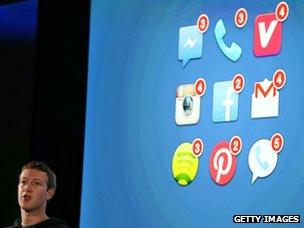Facebook's release of 'home' spurs privacy worries
- Published
- comments
Mark Zuckerberg: 'The home screen is really the soul of your phone'
Facebook's "home" software for Android phones could "destroy" privacy, warn industry watchers and analysts.
Unveiled on 4 April, home is a "wrapper" for Android and puts Facebook feeds on a phone's main screen.
But the detailed data that could be mined from home users could intrude on private life, commentators warned.
Many took issue with the claim that home put people, not apps, at the heart of the mobile experience, saying it would help Facebook sell ads.
Handset home
Home was shown off in a presentation given at Facebook's campus by the social network's founder Mark Zuckerberg. He said it was an attempt to do away with app-centred systems that were a legacy of the computer world in which people clicked on an icon to start a program.
Once installed on a phone, home takes over the lock screen and main display turning it into a live feed of information, notifications and images Facebook users are sharing.
The "always on" nature of home bothered industry watcher Om Malik from tech news website GigaOm who said it could be a route to gathering data about users that would otherwise be hard to find.
"This application erodes any idea of privacy," he wrote, external. "If you install this, then it is very likely that Facebook is going to be able to track your every move, and every little action."
Users of home could see their privacy "destroyed", he warned.
Harry McCracken at Time pointed out that many other apps can grab data like home but said it would be "comforting" to get confirmation from Facebook that it had no plans to datamine the lives of its users.
Their worries were echoed by Natasha Lomas at TechCrunch who said "The Facebookification of the mobile web is a threat to openness, to choice, to privacy - but only if you care about those things".
Ms Lomas wrote that home would create many winners and losers, external and said it was a way for Facebook gradually to take over more and more functions on phones. Home will have monthly updates and Ms Lomas expected many of those to use Facebook as the core controls for a handset.

The home software will swap apps for a people-centred system, said Facebook
She also wondered if home would be a success or prove unpopular with users.
"Facebook thinks it's more important to people than it actually is," Charles Golvin, an analyst at Forrester Research, told Reuters.
"For the vast majority of people, Facebook just isn't the be-all and end-all of their mobile experience," he said. "It's just one part."
"I see a more apathetic response among Facebook users than Facebook might be expecting," he added.
Jan Dawson, senior telecoms analyst at Ovum, said home was the "next best thing" to creating a Facebook operating system for mobiles.
Mr Dawson added that the change would let Facebook track more of a user's behaviour on devices and to serve up ads.
"That presents the biggest obstacle to success for this experiment: Facebook's objectives and users' are once again in conflict," he said. "Users don't want more advertising or tracking, and Facebook wants to do more of both."
The software will be available via Google's Play Store as a download and will work only with phones running Android 4.0 or higher - this accounts for about 50% of all Android phones. Home will be available on 12 April in the US and soon after in other territories.
No information was given about whether home would be redeveloped to work with Apple or Microsoft phones.
- Published4 April 2013
- Published30 March 2013
- Published28 February 2013
- Published11 March 2013